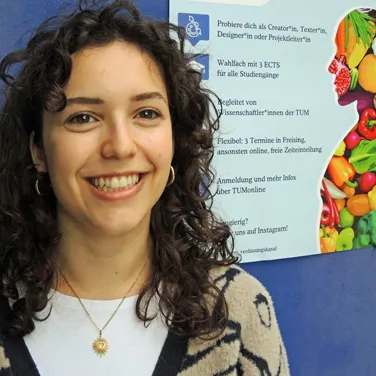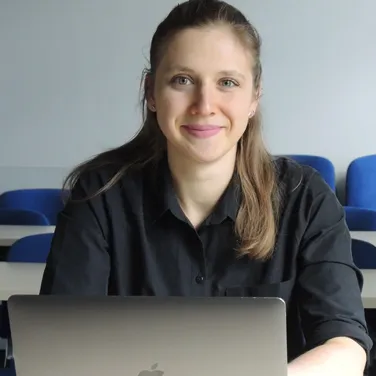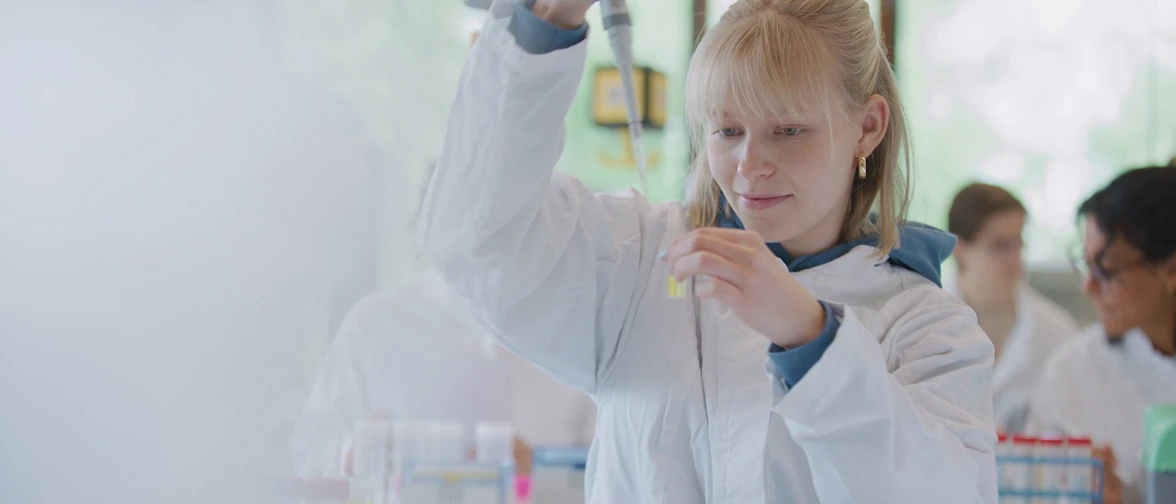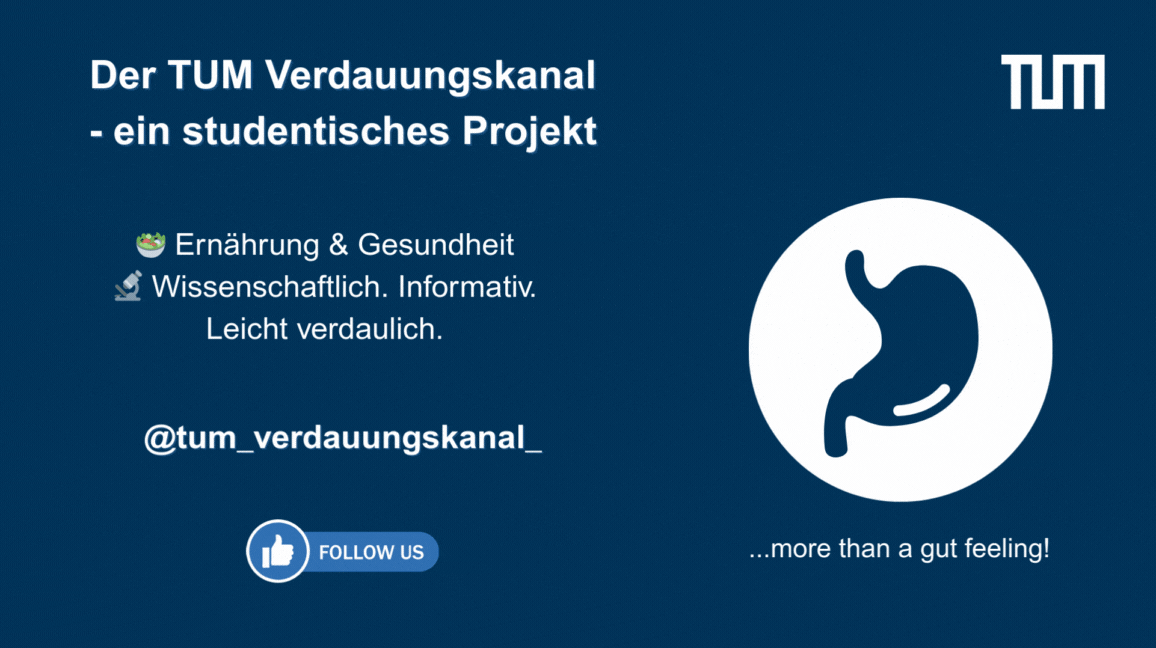Life Sciences Nutrition
Bachelor of Science (B.Sc.)
How can nutrition promote health and prevent diseases such as obesity, diabetes and cancer? In the Life Sciences Nutrition study program, you will learn about the influence of different foods on our body and how they control it. With this course, you will be at the threshold between biochemistry, human medicine and food science.
Do you want to answer the health policy questions of our future with findings from modern nutrition research? Then you've come to the right place in the Life Sciences Nutrition degree program at TUM in Weihenstephan.
Key Data
| Type of Study | Full Time |
| Standard Duration of Studies | 6 Semesters |
| Credits | 180 ECTS |
| Start of Degree Program | Winter Semester |
| Application Period | May 15 - July 15 |
| Admission Category | Aptitude Assessment for Bachelor (EfV) |
| Language of Instruction | German |
| Main Location | Freising (Campus Weihenstephan) |
| Costs |
The Bachelor's degree program in Life Sciences Nutrition provides in-depth expertise in order to be able to face the major challenges in the field of nutrition in today's world. In industrialized countries, the diet is characterized by the constant development of new foods and production processes, dietary trends, and a growing variety of supply and abundance, which often leads to health problems due to malnutrition. In addition, food intolerances and allergies are increasingly in focus and require more intensive research into the causes. At the same time, climate change is threatening food security in large parts of the world, leading to a massive increase in health problems caused by malnutrition.
Building on scientific fundamentals, supplemented by practical experience in the methodology of nutritional research, a comprehensive knowledge of human nutritional needs, the physiological effects of nutrients and the underlying molecular and biochemical processes in the human body is imparted. The focus of research is currently on so-called "personalized nutrition", which strives to take into account the individual needs of the metabolism in nutritional interventions. At the same time, however, our eating habits also shape agricultural production, which has a major influence on the release of climate-damaging emissions. Therefore, the topic of sustainability is an increasingly important aspect of our teaching, for example in the field of food technology or in nutritional physiology when assessing the suitability of vegetable protein sources for human nutrition.
Our goal is to educate scientists who work in an interdisciplinary manner at the interface of biochemistry, (intestinal) microbiology, physiology and medicine in order to investigate the effects of changes in the food environment on the human organism and to show ways to improve nutrition worldwide.
The combination of theory and practice from nutrition research, human medicine, food science, life sciences and public health, which is unique in Germany, offers optimal conditions for a professional future in research, nutritional medicine, industrial food production or pharmacy. Its operations range from clinical research to product development, food safety and public health education. With the special focus on "personalized nutrition" or "sustainable nutrition", there will be a wide range of career opportunities in the future.
In the food industry or the pharmaceutical industry, further qualifications with a focus on research are often required, which can only be acquired in the master's program. For this reason, many of our graduates are planning to pursue a master's degree program such as the Master's degree in Nutrition and Biomedicine at TUM.
From the beginning of your studies, you will be involved in areas such as human nutrition and physiology, in addition to deepening your knowledge in the fundamentals of biology, chemistry, mathematics and physics.
From the third semester onwards, the nutritional science expertise is expanded and deepened, including methodological and technical aspects in practical exercises. Furthermore, knowledge about the requirements for nutrition in different phases of human life and the influences of nutrition on the development, prevention, course and remission of diseases are imparted. This in-depth professional training in nutritional science or nutritional physiology and nutritional medicine is accompanied by modules in microbiology, biochemistry and food chemistry. Based on this, the teaching of clinical nutritional medicine deals with how these findings can be applied to adequate nutrition in the treatment of deseases.
On the one hand, the fifth and sixth semesters serve to develop an individual competence profile, according to inclinations and interests through elective modules, and on the other hand, to bring together all the professional and methodological competence learned as well as to prepare for the scientific thesis.
The curriculum provides a complete overview of the modules of the Bachelor's degree program Life Sciences Nutrition!
Our graduates have a sound basic knowledge of natural sciences and mathematics as well as interdisciplinary skills in the fields of human medicine, nutritional science, food science and life sciences.
With this knowledge, they can assess the pathophysiological causes of food intolerances and identify the reasons for malnutrition and malnutrition, and use laboratory experience to explore which treatment options are effective. Through to the methodological and technical approach and the various experimental research methods, our graduates are able to plan experiments and carry them out in practice. They can also apply for and supervise the conduct of clinical trials.
The knowledge gained during the course of study of the physiological processes for the regulation of hunger and satiety, the digestion and absorption of food, the transport processes and storage of nutrients, endocrine and neuronal communication, the interaction of nutrition and the immune system as well as the importance of indispensable and expendable nutrients make our graduates experts in the professional field of nutritional science.
The selection of elective modules in the fields of Molecular Nutritional Physiology, Food and Technology, Nutritional Medicine and Public Health as well as free elective modules Life Sciences Nutrition according to inclination and interest also leads to an individual competence profile. A wide-ranging education is possible here, as well as specialization in one or more areas of specialization.
Throughout their studies, our graduates are motivated to develop their own understanding of the multi-layered (biochemical/physiological/medical/ecological/socio-political) implications of the environmental factor of nutrition and at the same time are enabled to use their knowledge and skills to carry out responsible activities in the professional field of nutritional science.
Application requirements and eligibility
The prerequisite for applying for a place on the Bachelor's degree program in Life Sciences Nutritional Science is a university entrance qualification. This can either be a school-based university entrance qualification or a sufficient professional qualification.
More information on university entrance qualifications.
A further requirement is passing the two-stage aptitude assessment procedure (EfV), in which it is determined whether you are suitable for the special qualitative requirements of the Bachelor's degree program in Life Sciences Nutritional Science in addition to obtaining a higher education entrance qualification.
Proof of language skills
If you do not have a German university entrance qualification or German citizenship in the case of an international university entrance qualification (and have attended a German-language school for at least 2 years), you must provide proof of sufficient German language skills for the German-language Bachelor's degree program in Life Sciences Nutritional Science by the end of the application period.
Preliminary Documentation (VPD) by uni-assist
All applicants for a bachelor's degree, who did not obtain their university entrance qualification in Germany or from a school that offers the equivalent of the German Abitur exam need a preliminary documentation (VPD) have to apply via uni-assist e.V.
| Important: the processing of the VPD at uni-assist can take 6-8 weeks! |
|---|
| An early application is therefore recommended, otherwise delays in processing the application documents at TUM must be expected. This is because only complete application documents can be processed. |
Semester fees and tuition fees at TUM
All students have to pay a semester fee for the student union (Studierendenwerk).
| Tuition fees for international students |
|---|
| For international students from third countries, i.e. countries that do not belong to the European Economic Area, tuition fees will be charged. All information on fee levels, waivers and scholarship programs can be found on the website on tuition fees for international students. |
Application period and start of studies
The application period is from 15 May to 15 July each year for the following winter semester. Start of the degree program is only possible in the winter semester.
See here for semester dates. In the Bachelor's degree program in Life Sciences Nutritional Science, it is only possible to apply for a higher semester in the summer semester.
Online application
Application is only possible via our online application portal, where you need to set up an applicant account.
Instructions for your online application
Please upload all documents to TUMonline before the end of the application deadline. Documents submitted via email cannot be processed.
| Please note: |
|---|
| We can only consider your application if you upload all required documents and submit the complete application within the application period. |
Aptitude assessment procedure
Admission to the Bachelor's degree course in Life Sciences Nutritional Science requires special qualifications. Our first-year students are therefore selected via a two-stage aptitude assessment procedure.
First stage of the procedure
Based on the application documents received, the first stage involves an assessment according to established selection criteria using a points system. In addition to the average grade of the university entrance qualification (HZB), the grades listed in the HZB in the subjects of mathematics and the best continued natural science (chemistry, biology or physics) are included in the assessment. Proven additional extracurricular qualifications relevant to the course of study, such as a relevant, completed vocational training or apprenticeship, an internship of at least four weeks or successful participation in the "Jugend forscht" competitions lead to participation in the second stage of the procedure (unless direct admission has already been granted). The aptitude committee decides on the recognition of the additional qualification.
Applicants who achieve the specified minimum score of 88 points will receive direct admission in the first stage. If the assessment in the first stage results in 65 or fewer points, the applicants are deemed unsuitable and are rejected.
Second stage of the procedure (Online aptitude test)
The remaining applicants who are neither admitted nor rejected based on their score in the first stage will take a short (30-minute) written online aptitude test in the second stage.
At the latest one week before the date of the online aptitude test, we will automatically send you an email with the Exam-TUM -Moodle Login and access data. This means that you can access the Moodle course one week before the online aptitude test to get an overview of the system and read all the information.
The online aptitude test itself will not be activated until the scheduled date.
The test takes place in written form and in German as an online test. It lasts 30 minutes and comprises approx. 10-15 questions. Materials to prepare for the test will not be provided. The questions relate to scientific and mathematical school knowledge as well as general knowledge of current, socially relevant and publicly discussed topics relating to nutritional science, nutritional medicine and nutritional economics.
Applicants should demonstrate that they have
- be able to combine knowledge acquired at school and beyond from different disciplines,
- be able to describe and quantify life science processes using the scientific disciplines of biology, chemistry and physics as well as mathematical and statistical methods,
- have knowledge of current, socially relevant and publicly discussed challenges in science, in particular in nutritional science, nutritional medicine and nutritional economics, and be able to describe current approaches to solutions and research topics.
No prior knowledge is required to solve the tasks, which is only taught during the course of study. The overall assessment of the second stage is the sum of the HZB points multiplied by 0.5 (points = 120 - 20*grade) and the score of the online test multiplied by 0.5.
Applicants who have achieved at least 80 points in the second stage have passed the aptitude assessment procedure and will be admitted.
Applicants with an overall score of 79 points or less in the second stage are not suitable for the degree program and will be rejected.
The notification of rejection or admission to the program will be displayed in the TUMonline account.
More detailed information on the procedure can be found in the statutes on the aptitude assessment for the Bachelor's degree program in Life Sciences Nutritional Science.
Enrollment
After admission to the program, the study place must be accepted in the applicant's account, the application for enrollment has to be signed and uploaded together with the missing documents for enrollment. And also the semester fees must be paid. All relevant information is displayed in the TUMonline applicant account.
Details on the enrollment process
Glossary of documents
| Please note: |
|---|
| From the time of admission, we will only contact our students via the tum.de or mytum.de email address, which can be found in the applicant account. Instructions for setting up the e-mail address at TUM. |
Practice and community

“The program offers much more than you might expect at first. Alongside a comprehensive scientific curriculum, we gain lab experience through numerous internships. I really value the high quality of teaching and the close-knit student community, which makes campus life in Weihenstephan particularly enjoyable.”
Diversity in study program

“I love the variety of topics – from biochemical basics to nutrition trends. I especially enjoy the link between theory and practice: we analyze scientific studies, conduct our own experiments, and gain valuable lab experience. The dedicated lecturers and the green, peaceful campus in Freising make studying even more enriching.”
The right choice of study

“First, I began studying to become a teacher in nutrition and home economics, where I gained my first insights into nutrition and metabolism. I was immediately fascinated: Wanting to go deeper, I changed my program. The combination of medicine, natural sciences, and food science is incredibly diverse. I realize every day that it was the right decision.”
- Degree program documentation
The degree program documentation presents the concept of the study program.
- Module catalog
The module catalog lists all modules of the current version of the degree program, and is updated before the start of each semester.
Enrolled students who are studying in previous degree program versions can find their module catalog in TUMonline.
Tip: For completed modules, you can create an individual module catalog in the TUMonline application “My Studies” (icon top right). TUM School of Life Sciences recommends to use this option every semester (at the latest after graduation), as it facilitates the recognition of modules and achievements in your future professional life!
- Curriculum
The degree chart gives an overview and recommendation, which modules you should take in which semester according to Academic and Examination Regulations (FPSO).
- Timetable (TUM ID required for login):
This timetable is intended to give an overview of the planned compulsory and elective modules of a semester. It is for orientation purposes only and will not be updated during the semester!
Via TUMonline a timetable for each semester according to the FPSO can be created.
Also an individual timetable can be created, which can contain not only the dates of the selected courses, but also personal appointments.
First steps with TUMonline
- General Academic and Examination Regulations at TUM (APSO)
- Academic and Examination Regulations (FPSO)
Examination dates & registration via TUMonline
In TUMonline you can register for the module examinations that accompany your studies.
Important: You can only take most of the exams if you have actively registered yourself via TUMonline within the registration period. The registration and deregistration period will be displayed at the exam date.
Further examination matters
- Board of Examination
The board of examination is a committee consisting of university professors and lecturers of the degree program. The chairperson of the board of examination of your degree program is Prof. Dr. rer. nat. Martin Klingenspor. Applications to the board of examination are received by the secretary and submitted to the board of examination for decision. The secretary can be reached by sending an email to examination.co(at)ls.tum.de.
Degree program - specific information about graduation can be found in the
Wiki Life Sciences – Study and Teaching - Graduation (TUM ID required for login)
Personal student advising

Dr. Sabine Köhler
Campus Office, ground floor, room 06
Weihenstephaner Steig 22, 85354 Freising
Tel. +49 8161 71 3336
bsc-nutrition.co(at)ls.tum.de
Consultation hours: Thursday 1:30 p.m. - 3:30 p.m. and by arrangement
Everything you need to know!
Many general questions can already be answered by the FAQs.
Current and course-specific information for students of the TUM School of Life Sciences
Wiki Study and Teaching (with TUM login only)







